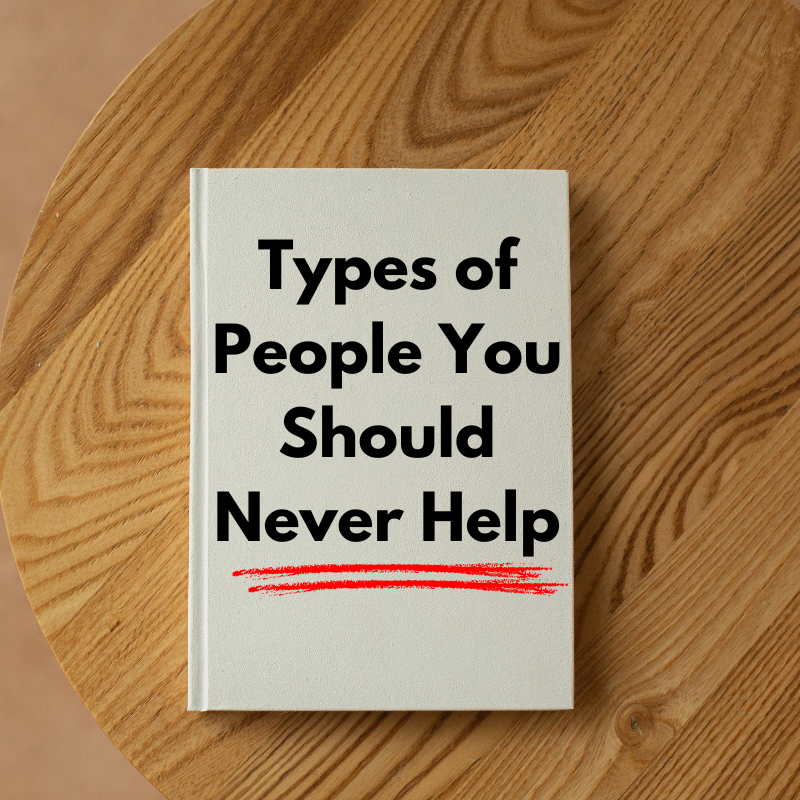Helping others is a virtue many of us aspire to. It’s ingrained in human nature to offer support, whether emotionally, financially, or physically. However, not everyone is worthy of your time, energy, or resources. In fact, some people can actually cause harm to your mental, emotional, and even physical well-being.
While it may feel like you should help everyone, there are certain types of people who you should avoid offering your assistance to. Recognizing who these individuals are can save you a lot of heartache and help you prioritize your own well-being. Let’s dive into the types of people you should never help and why it’s essential to set boundaries.
The Chronic Victim
Signs to Watch Out For:
- They constantly blame external factors for their problems.
- They consistently avoid accountability for their actions and choices.
- They regularly seek help but never show signs of improvement.
A chronic victim is someone who always seems to be in a state of crisis. They habitually play the role of the “victim,” but never seem to make any effort to improve their situation. While we all face challenges from time to time, the chronic victim has a pattern of constantly leaning on others for support without ever taking responsibility for their part in their issues.
Helping these individuals might feel like you’re doing a good deed, but in reality, you are enabling them to remain stuck in their cycle of helplessness. Rather than empowering them to change, you may inadvertently contribute to their dependency on others. Bottom line: If someone consistently refuses to take responsibility for their own life, helping them may only deepen their victim mentality.
The Manipulator
Signs to Watch Out For:
- They use guilt to get what they want.
- They twist facts or manipulate emotions to their advantage.
- They make promises but rarely deliver.
Manipulators are experts at getting people to do their bidding without them even realizing it. They often use guilt, charm, or even emotional blackmail to extract favors from others. They’ll make you feel like you’re a bad person if you don’t help, but once they get what they want, they move on to the next target.
If you find yourself constantly feeling drained after interacting with someone, or if they make you feel like you’re walking on eggshells, you may be dealing with a manipulator. Offering help to these people is rarely appreciated and often results in more harm than good. Protect your emotional energy by keeping a healthy distance from manipulators.

The Energy Vampire
Signs to Watch Out For:
- They drain your energy without contributing anything positive.
- Every conversation with them feels like a one-way street.
- They never seem to care about your well-being or struggles.
Energy vampires are people who drain your emotional and mental energy without offering any meaningful support in return. They may constantly talk about their problems, leaving you feeling exhausted or emotionally depleted after spending time with them. These individuals are typically self-absorbed and have little regard for your needs.
While it’s okay to support a friend during tough times, energy vampires make it all about themselves without ever checking in on you. Helping them can leave you feeling empty, and you may find that you start avoiding them out of sheer fatigue. Protect your mental health by keeping your distance from energy vampires.
The Entitled Person
Signs to Watch Out For:
- They expect help without offering anything in return.
- They believe others owe them something.
- They lack gratitude and take advantage of your kindness.
Entitled individuals believe that the world owes them something whether it’s your time, money, or resources. They rarely express gratitude for the help they receive and are quick to take advantage of others’ kindness. You may notice that they never make an effort to return the favor or offer support when you need it.
Helping an entitled person can lead to a sense of frustration and resentment. They’ll always expect more, and you’ll find that the balance in the relationship is skewed. Instead of feeling appreciated, you’ll feel used. Setting boundaries with entitled individuals is crucial to preserving your own sense of self-worth.
The Narcissist
Signs to Watch Out For:
- They demand constant attention and admiration.
- They disregard your needs and only focus on their own.
- They have a lack of empathy or concern for others’ feelings.
Narcissists are individuals who are excessively preoccupied with themselves. They seek admiration and attention from others, often without considering how their actions affect the people around them. While they may seem charming or charismatic at first, the relationship quickly becomes one-sided as they expect constant validation and support.
Helping a narcissist can be exhausting and ultimately unfulfilling, as they rarely show appreciation for anything you do. They are more likely to take your help for granted and may even exploit your kindness for their own gain. It’s essential to recognize when you’re dealing with a narcissist and avoid offering assistance, as they rarely give anything back in return.
The Toxic Critic
Signs to Watch Out For:
- They constantly criticize or belittle others.
- They rarely offer constructive feedback.
- They have a negative, defeatist attitude.
The toxic critic is someone who finds fault in everything and everyone. They have a habit of pointing out flaws without offering any solutions or support. They may tear you down in subtle (or not-so-subtle) ways, making you feel like you’re never good enough, no matter how much you try.
Helping a toxic critic can lead to feelings of inadequacy and self-doubt. Instead of offering support, they may constantly find ways to undermine you or make you feel small. These types of people rarely offer positive encouragement or gratitude, making any help you give them feel futile.
Why Setting Boundaries Is Crucial
Helping others can be incredibly rewarding, but it’s important to recognize when your help may do more harm than good. Setting boundaries is key to protecting your mental health, emotional well-being, and even your physical energy. When you refuse to help individuals who are manipulative, entitled, or toxic, you are taking a step toward healthier relationships and a more fulfilling life.
Remember, saying “no” is not a reflection of your character or kindness. It’s a form of self-care. By focusing your energy on people who genuinely appreciate your help, you can create deeper, more meaningful connections while protecting yourself from unnecessary stress and negativity.
Conclusion: Learn to Say No
In life, it’s important to recognize the types of people who may drain your energy and prevent you from living a balanced, healthy life. By setting clear boundaries with chronic victims, manipulators, narcissists, and others, you can protect your well-being and reserve your time and energy for those who truly deserve your help.
Help is a precious gift don’t waste it on those who only take and never give back. By choosing wisely who you offer support to, you can create more meaningful, positive relationships and enjoy a life of balance and peace.
FAQs
1. Why should I avoid helping certain people?
Helping others is generally a good thing, but some individuals may take advantage of your kindness, drain your energy, or create dependency. Recognizing these types of people can help you protect your well-being and focus on helping those who truly deserve it.
2. Isn’t it selfish to refuse to help someone?
Not necessarily. Setting boundaries is about self-preservation and ensuring your help is meaningful. Helping someone who doesn’t appreciate it or abuses your kindness can lead to burnout and resentment.
3. How can I say no without feeling guilty?
Practice assertiveness and remind yourself that saying no is not a rejection of the person but a protection of your own well-being. Offer alternative solutions or resources if appropriate.
4. What if the person I shouldn’t help is a close friend or family member?
It can be challenging to set boundaries with loved ones, but it’s important to prioritize your mental and emotional health. Offer support in ways that don’t enable negative behavior, such as encouraging them to seek professional help or take responsibility for their actions.

